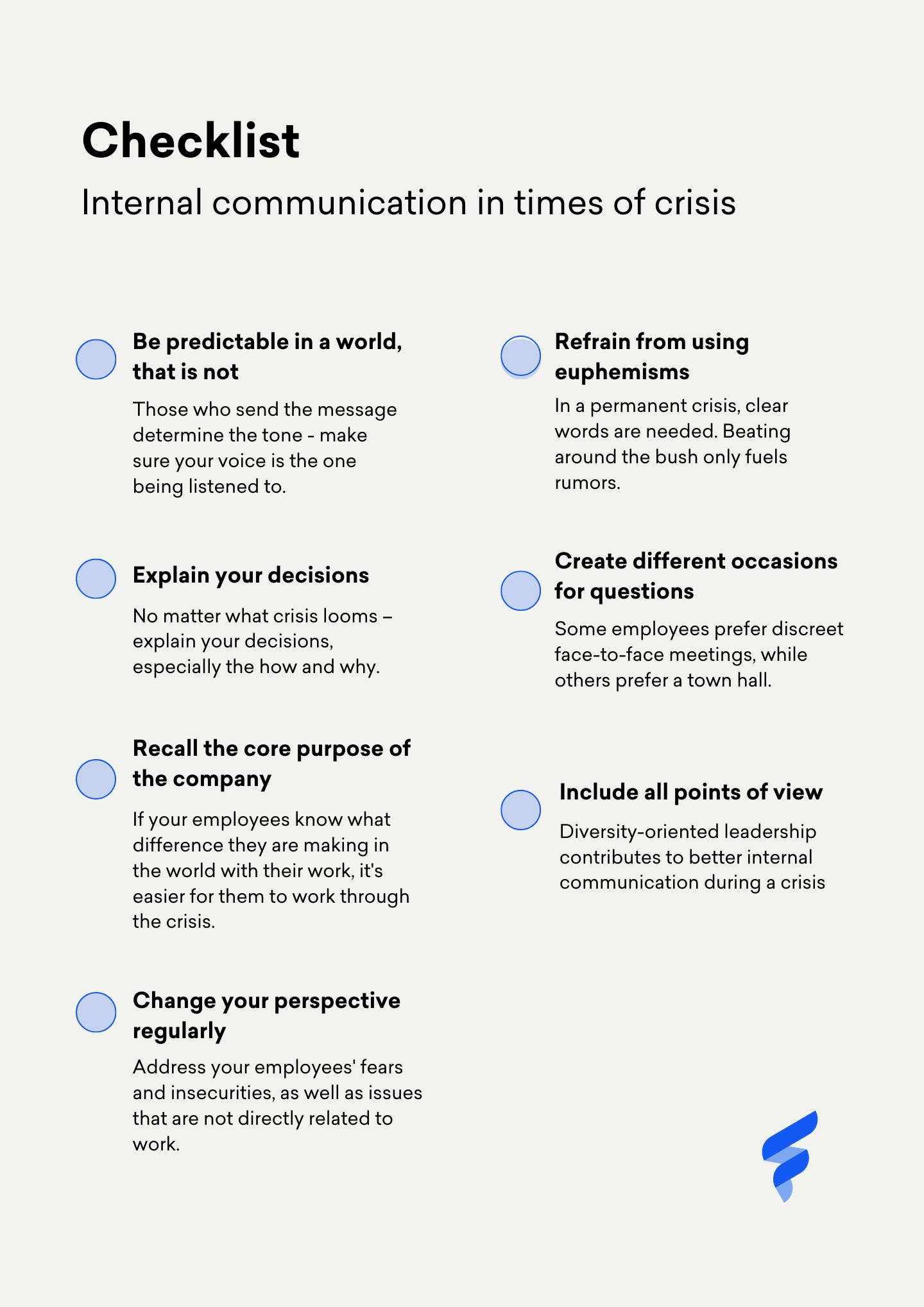17.11.2022
Internal Communications
4 min read


Employee communication in times of crisis: be predictable in an unpredictable world
As a company, you can't control ongoing external crises. But there are ways to give employees support. Jonathan Fasel, crisis communication expert, sums them up.
In addition to the consequences of the covid-19 pandemic, companies are now struggling with the effects of the war in Ukraine, supply bottlenecks, exorbitant energy prices, and record inflation. This results in a mix of crises that penetrate deep into the daily lives of employees and unsettles them. Rumors of production stoppages due to energy shortages are doing the rounds. Others are afraid of a drop in orders and fear for their jobs.
This makes it even more important to give employees support in these times. For managers, internal communication is a balancing act: on the one hand, they must ensure that everyday tasks continue to be carried out, while at the same time providing clarity and direction within the company. This requires committed and transparent leadership skills to guide employees during the crisis.
The following recommendations for action will help you navigate through such situations.

Jonathan Fasel, crisis communication expert
The journalist and former corporate spokesperson leads the communications agency fasel & fasel, which specializes in PR and crisis communication. His career path - Studied journalism and political science in Leipzig and Grenoble, established corporate communications for the European Power Exchange in Paris, was the spokesperson for a company in the field of digitalization in Leipzig, and ran campaigns for ministries and international companies.
1. Talking is gold – especially in an ongoing crisis
People appreciate it when they are regularly informed - even about minor changes. Because that way, they are involved: Regular employee communication conveys appreciation and respect - an essential mitigating factor against the sense of powerlessness in the face of a crisis.
Researchers from the Institute for Applied Media Science in Switzerland also came to this conclusion. In an evaluation of qualitative interviews with managers, they found that regular communication increases the motivation of employees. Whoever communicates also retains the power of interpretation: if you are the first sender of a message, you determine the tone.
2. Explain your decisions
No matter what crisis is looming - be predictable in a world that is not. Talk about things that have a high degree of certainty. Explain and justify all plans, measures, and decisions. Clarify the most important questions, especially the how and why. This promotes understanding of your actions and the business strategy.
3. Recall the core purpose of the company
The mission and vision of your company, i.e., the "what" and "why" of your actions, provide orientation - especially in times of crisis. Ideally, both are clearly formulated and communicated both internally and externally. Use mission and vision statements to give meaning to your work. If your staff knows what they are doing in the world with their work, it will be easier for them to work in a crisis.
And if you have not clearly defined your core purpose, get to work: mission and vision are the foundation of a healthy company. And no, "making money" is considered neither mission nor vision.
4. Regularly change the perspective
Put yourself in the employees' shoes and try to understand their concerns and fears. Address possible questions, fears, and insecurities of your employees. If your employees feel this honest empathy, it will be easier for them to trust you. Include topics that are not directly related to work - this makes it clear that you are concerned about people and not only about the well-being of the company.

"Refrain from euphemisms! Crises are not thorny opportunities."
Jonathan Fasel
Crisis communication expert and CEO of fasel & fasel
5. Refrain from euphemisms
A study on internal communication during the global financial crisis in 2009 by the University of Milan found significant differences between what managers wanted to communicate and what actually reached employees. The reason for this is blurred messaging from management twisted into a positive narrative, causing suspicion among many employees.
The employees interviewed criticized top-down communication and accused their companies of opportunism. Refrain from euphemisms! Crises are not "thorny opportunities". If your employees are worried about their jobs, they need clear messages. Beating around the bush only fuels the rumor mill in times of crisis. Win the trust of your team through honesty, not false promises or appeasement.

6. Create opportunities for questions
Everyone processes information differently and has different communication needs. A study by Jesper Falkenheimer from 2022 suggests that employees perceive internal crisis communication messages differently depending on which internal organizational group they belong to. People in production, for example, are more likely to need to be met face-to-face.
Email and video conferencing are well-suited for employees who work on a computer screen. For both groups, low-barrier interventions such as employee apps for smartphones are suitable. In this way, communication can be tailored to the individual needs.
Think about the size of the format: some need a physical town hall meeting with the entire staff to ask questions. Others prefer a discreet lunch with their supervisor. Even with remote working, there are different ways to do this - from a digital staff meeting with a chat Q&A session to a small group team event where sensitive issues can be addressed in person in a relaxed setting.
7. Include perspectives from all target groups
You should not only decide on the messages and channels of internal communication in the small circle of the already well-informed leadership. A 2021 study by Yeunjae Lee finds that diversity-oriented leadership contributes to better internal communication during a crisis because it is seen as more transparent. It satisfies employees' need for autonomy, competence, and recognition.
Conclusion
Honesty, reliability, empathy: This will help you and your team survive even long-term crises. In the best case scenario, the team will even emerge stronger. Because those who stick together in an ongoing crisis get to know each other better, and in times of trouble, remain loyal to their own team.
Share
Don’t forget to share this content
Copy








